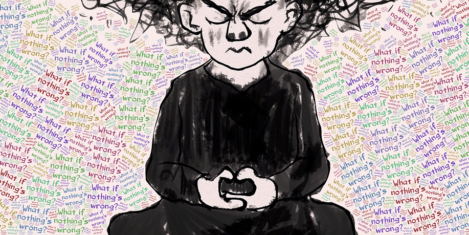May 19, 2025
Moments of wonder can help to fend off depression and stress, research finds
 There’s a famously apocryphal story about the making of the 1965 biblical epic The Greatest Story Ever Told. During a rehearsal, John Wayne, playing the Centurion at the Crucifixion, was asked by director George Stevens to deliver his line about Jesus Christ being the Son of God “with awe.” So, in the next take, the actor changed the line from the Bible to: “Awe, truly this man was the son of God.” Turns out that a daily dose of awe may be just what we all need. A new peer-reviewed study published in the Journal Nature suggests that brief moments of wonder and amazement can significantly reduce symptoms of depression and stress, even in individuals coping with persistent physical and mental health challenges. (more…)
There’s a famously apocryphal story about the making of the 1965 biblical epic The Greatest Story Ever Told. During a rehearsal, John Wayne, playing the Centurion at the Crucifixion, was asked by director George Stevens to deliver his line about Jesus Christ being the Son of God “with awe.” So, in the next take, the actor changed the line from the Bible to: “Awe, truly this man was the son of God.” Turns out that a daily dose of awe may be just what we all need. A new peer-reviewed study published in the Journal Nature suggests that brief moments of wonder and amazement can significantly reduce symptoms of depression and stress, even in individuals coping with persistent physical and mental health challenges. (more…)



















![Gallup has published its 2023 Gallup Global Emotions report [registration] – a study of employee sentiment in the UK workforce](https://workplaceinsight.net/wp-content/uploads/2023/11/frustration-7505960_1280-250x250.png)

 Vulnerable narcissistic leaders are especially likely to make employees irritated during crisis situations, reveals new research from NEOMA Business School. Birgit Schyns, Distinguished Professor of People & Organisations at NEOMA, and co-authors analysed survey data on workers in the UK education sector during the COVID-19 pandemic. Respondents reported their levels of irritation and Coronavirus-related worry in five weekly surveys, as well as their experiences with vulnerable narcissistic leadership – an unstable form of leadership characterised by covert feelings of entitlement.
Vulnerable narcissistic leaders are especially likely to make employees irritated during crisis situations, reveals new research from NEOMA Business School. Birgit Schyns, Distinguished Professor of People & Organisations at NEOMA, and co-authors analysed survey data on workers in the UK education sector during the COVID-19 pandemic. Respondents reported their levels of irritation and Coronavirus-related worry in five weekly surveys, as well as their experiences with vulnerable narcissistic leadership – an unstable form of leadership characterised by covert feelings of entitlement. 











July 16, 2024
Put on your own mask first: Leadership strategies for stress management and emotional resilience
by Bruce Watt • Comment, Wellbeing